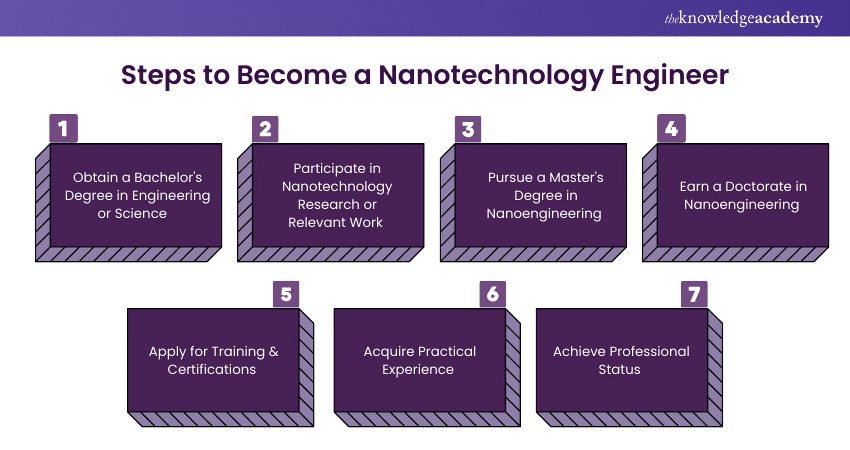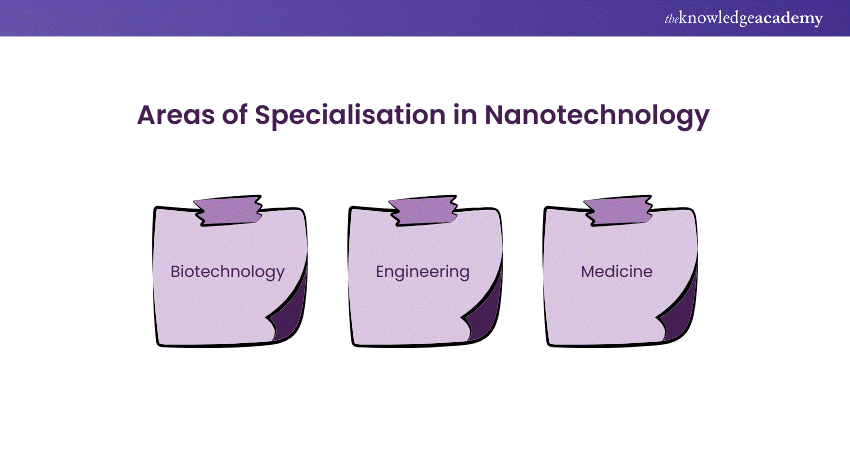We may not have the course you’re looking for. If you enquire or give us a call on +44 1344 203999 and speak to our training experts, we may still be able to help with your training requirements.
Training Outcomes Within Your Budget!
We ensure quality, budget-alignment, and timely delivery by our expert instructors.

Nanotechnology is one of the fastest-growing areas of innovation and discovery. Imagine changing matter at the atomic and molecular level – a feat that could revolutionise industries and improve lives. If this excites you, a career as a Nanotechnology Engineer might be your perfect fit. But How to Become a Nanotechnology Engineer?
In this blog, we will delve into this cutting-edge field and uncover the steps on How to Become a Nanotechnology Engineer. Get ready to dive into the world of Nanotechnology and make your mark on the future.
Table of Contents
1) What is a Nanotechnology Engineer?
2) Steps to Become a Nanotechnology Engineer
a) Obtain a Bachelor's Degree in Engineering or Science
b) Participate in Nanotechnology Research or Relevant Work
c) Pursue a Master's Degree in Nanoengineering
d) Earn a Doctorate in Nanoengineering
e) Apply for Training & Certifications
f) Acquire Practical Experience
g) Achieve Professional Status
3) Areas of Specialisation in Nanotechnology
4) Conclusion
What is a Nanotechnology Engineer?
Nanotechnology, with its boundless potential, is the cornerstone of future technological advancements. A Nanotechnology Engineer ventures into the quite fascinating world of manipulating matter at atomic and molecular levels, essentially crafting the fundamental components of our universe.
From designing the most advanced medical devices that can travel through the human body to developing advanced materials that can support rarely-seen concepts, the span of such a field is rather breathtaking. This work demands a solid foundation in core sciences such as physics, chemistry, and material science, along with a sharp eye for detail and a sense of innovation.
As a Nanotechnology Engineer, you will be pushing the boundaries of research at the very frontier of developing technologies that will change industries, better lives, and transform tomorrow's world. You will be in a unique position to leave your mark on the future. Excited to turn your passion into an exciting career journey?
Steps to Become a Nanotechnology Engineer
To become a Nanotechnology Engineer, one should complete a multi-step education and training process. Let's explore the steps involved:

1) Obtain a Bachelor's Degree in Engineering or Science
To become a Nanotechnology Engineer, a solid foundation in either engineering or the sciences is essential. First and foremost, one needs to acquire a bachelor's degree in most cases in electrical, mechanical, or material-type engineering or physics, chemistry, or material science.
The coursework typically includes subjects such as quantum mechanics, nanoscale fabrication techniques, nanostructured materials, and the principles of nanoscale systems. These subjects are designed to develop strong analytical, problem-solving, and critical-thinking skills, which are crucial for Nanotechnology Engineers.
2) Participate in Nanotechnology Research or Relevant Work
Engaging in Nanotechnology research or relevant work is crucial for aspiring Nanotechnology Engineers. This field demands a deep understanding of nanoscale science and engineering grounded in core sciences such as physics, chemistry, and materials science.
Proficiency in these subjects involves mastering concepts related to quantum mechanics, surface chemistry, and the unique properties of materials at the nanoscale.
Hands-on research experience is vital. This can be gained through internships or participation in university-based Nanotechnology labs. These opportunities allow young engineers to hone their experimental and problem-solving skills while actively contributing to the rapid advancements in this dynamic field.
3) Pursue a Master's Degree in Nanoengineering
The next step in this process is a master's degree in Nanoengineering or a closely associated discipline like Materials Science, Electrical Engineering, or Chemical Engineering. These graduate degrees provide advanced, systematic training in the principles and applications of Nanotechnology. It equips students with specific knowledge and technical capabilities for designing, developing, and optimising nanoscale devices and systems.
Individuals with master’s degrees will be well-equipped to pursue diverse and fulfilling careers in sectors such as electronics, energy, health, and environmental technology. Their expertise will be instrumental in addressing complex challenges and driving innovation within the rapidly expanding field of Nanotechnology.
Master the future of Nanotech with our specialised Advanced Technologies Courses – join today!
4) Earn a Doctorate in Nanoengineering
Becoming a Nanotechnology Engineer requires the successful completion of advanced and comprehensive scientific study and research. Aspiring Nanotechnology Engineers should pursue a doctorate, or PhD, in a specialised area of nanoengineering.
The advanced degree in Engineering with Specialisation in Advanced Materials, provides rigorous training and expertise in designing and developing. Also, working with materials, devices, and systems at the nanoscale: that is, down at the scale of atoms and molecules. Doctoral students are given the most modern training in the competent design, development, and functioning of materials, devices, and systems at the nanoscale.
They also carry out practical work on innovative research programs that extend the capabilities of Nanotechnology. At the end of the PhD, the graduates are fully equipped to meet various highly challenging problems in domains ranging from renewable energy sources and medicine to computing and aerospace engineering.
5) Apply for Training & Certifications
The journey to becoming a Nanotechnology Engineer involves a strong educational foundation, gaining practical experience, and committing to continuous learning. Now, the next step is to pursue relevant training and certifications, which demonstrate your understanding of engineering principles and provide a stepping stone towards professional advancement.
With these certifications, you can gain practical experience through internships, co-op programmes, or entry-level positions in the Nanotechnology industry. These hands-on experiences allow aspiring engineers to apply their academic knowledge to real-world challenges, enhancing their problem-solving skills in various Nanotechnology applications.
Become a Nano expert with us! Try our Nanotechnology Training today and shape the technologies of the future.
6) Acquire Practical Experience
To be a Nanotechnology Engineer, one must adopt an involved methodology that carefully dovetails stringent academic training with hands-on practical experience in the field.
Having the right academic credentials is not enough; a Nanotechnology Engineer needs to gain practical experience in applying this knowledge. This can be obtained through internships, co-op programs, entry-level positions, or even in research laboratories or high-tech companies dealing in Nanotechnology. By rigorous academic preparation mixed with hands-on practical training, anyone is well on their way to creating a fulfilling, dynamic career as a Nanotechnology Engineer.
7) Achieve Professional Status
Students get the chance to apply the knowledge learned in class to real-world problems and better their problem-solving abilities by learning about the most advanced developments in this area. Building up a professional network at conferences, seminars, and through industry associations greatly serves for further collaboration options and future job opportunities.
Through all of this, the Nanotechnology Engineer remain to put forth a keen mind, an analytical thinking part, and a passionless innovative commitment. One needs to keep in touch with the ever-changing scenario of both nanoscale science and engineering. One should also continuously update skills and knowledge to be at the cutting edge in this dynamic and exhilarating field.
Areas of Specialisation in Nanotechnology
Nanotechnology is very diverse and interdisciplinary. Specialised use in several industry sectors is available for Nanotechnological applications. Three of the major areas of specialisation in Nanotechnology include Biotechnology, Engineering, and Medicine.

1) Biotechnology
Nanotechnology allows manipulation of the bio-system at the molecular level, which helps in the development of biotechnological fields such as Genetic Engineering, drug delivery systems, and regeneration of tissues. Such nanoscale devices and materials can then be used to target cells or molecules during treatment, thereby enhancing the efficiency and precision of treatment.
2) Engineering
Nanotechnology is used by Engineers in designing innovative materials, sensors, and energy storage facilities. Since Engineers' structure and device at atomic and molecular levels, a material can be created with extraordinary strength, flexibility, and functionality. It has numerous applications in everything from construction and transportation to electronics and renewable energy.
3) Medicine
Applications of Nanotechnology include the medical field, which allows for diagnostics, therapeutics, and regenerative medicine. Nanosized tools and particles are going to enable early detection of diseases, more efficient delivery of drugs, and even stimulate healing within the body. For example, nanoparticles that are designed to locate cancer cells could increase the effectiveness of treatments by reducing the number of good cells damaged.
Master Reverse Engineering with our Reverse Engineering Training – join now!
Conclusion
We hope this blog has provided you with valuable insights on How to Become a Nanotechnology Engineer. Embarking on this journey is one of the most rewarding and exciting opportunities to work at the forefront of scientific innovation. If you are determined, passionate about science, and eager to expand your knowledge constantly, you’re on the path to a fulfilling career, shaping the technologies of the future as a Nanotechnology Engineer.
Unlock the tiny world of Nanotech with Sensor and Data Fusion Training. Register today!
Frequently Asked Questions

A strong foundation of a bachelor's degree in Nanotechnology, nanoscience, laboratory science, engineering technology, materials science, biotechnology, chemistry, biology, or a related field is required to become a Nanotechnologist.

According to Glassdoor, the estimated total pay for a Nanotechnology Engineer is £54,000 per year.

The Knowledge Academy takes global learning to new heights, offering over 30,000 online courses across 490+ locations in 220 countries. This expansive reach ensures accessibility and convenience for learners worldwide.
Alongside our diverse Online Course Catalogue, encompassing 19 major categories, we go the extra mile by providing a plethora of free educational Online Resources like News updates, Blogs, videos, webinars, and interview questions. Tailoring learning experiences further, professionals can maximise value with customisable Course Bundles of TKA.

The Knowledge Academy’s Knowledge Pass, a prepaid voucher, adds another layer of flexibility, allowing course bookings over a 12-month period. Join us on a journey where education knows no bounds.

The Knowledge Academy offers various Advanced Technologies Courses, including Nano Technology Training, Internet of Things IoT Systems and Applications Training and Reverse Engineering Training. These courses cater to different skill levels, providing comprehensive insights into Nanotechnology.
Our Advanced Technology Blogs cover a range of topics related to Nanotechnology, offering valuable resources, best practices, and industry insights. Whether you are a beginner or looking to advance your Advanced Technology knowledge, The Knowledge Academy's diverse courses and informative blogs have got you covered.
Upcoming Advanced Technology Resources Batches & Dates
Date
 Nano Technology Training
Nano Technology Training
Fri 6th Dec 2024
Fri 7th Feb 2025
Fri 4th Apr 2025
Fri 6th Jun 2025
Fri 8th Aug 2025
Fri 3rd Oct 2025
Fri 5th Dec 2025







 Top Rated Course
Top Rated Course



 If you wish to make any changes to your course, please
If you wish to make any changes to your course, please


